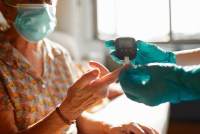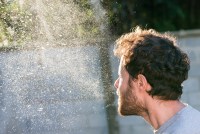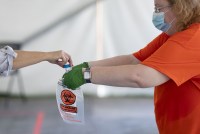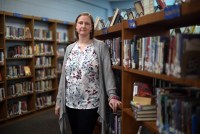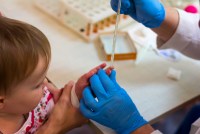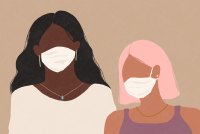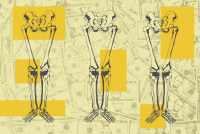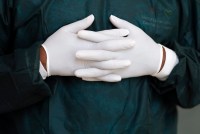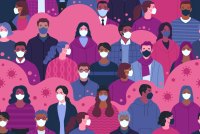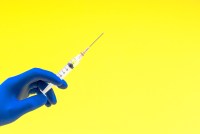Latest KFF Health News Stories
They Work in Several Nursing Homes to Eke Out a Living, Possibly Spreading the Virus
An analysis of location data from 30 million smartphones found that facilities across the country that share the most workers also had the most COVID-19 infections. The “Kevin Bacon of nursing homes” in each state — the one with the most staffers working at other nursing homes — was likely to have the worst outbreaks of coronavirus contagion.
Lo que sabemos sobre la transmisión aérea del coronavirus
Aunque los CDC removieron la información de su sitio web, muchos incidentes y estudios apuntan hacia la idea de que las partículas en el aire juegan un papel más importante de lo que se pensaba.
What We Know About the Airborne Spread of the Coronavirus
The Centers for Disease Control and Prevention has gone back-and-forth on this issue. One thing remains clear: Though science is evolving, indications do point toward the potential for airborne transmission.
Reapertura de universidades generó 3,000 nuevos casos de COVID por día, según estudio
Los investigadores comprobaron que solo reabrir una universidad agregó 1.7 nuevas infecciones por día por cada 100,000 personas en un solo condado.
Colleges’ Opening Fueled 3,000 COVID Cases a Day, Researchers Say
In a draft study, researchers correlated cellphone data showing students’ back-to-campus movements and county infection rates to quantify how the coronavirus spread as colleges and universities reopened for the fall semester.
Students’ Mass Migration Back to College Gets a Failing Grade
Epidemiologists and disease modelers tried to predict what would happen when students moved back to campus. Although some universities listened to their advice, that didn’t stop outbreaks from happening.
With No Legal Guardrails for Patients, Ambulances Drive Surprise Medical Billing
Studies show that at least half of ground ambulance rides across the nation leave patients with “surprise” medical bills. And a $300-a-mile ride is not unusual. Yet federal legislation to stem what’s known as balance billing has largely ignored ambulance costs.
Kids Are Missing Critical Windows for Lead Testing Due to Pandemic
Inspections for lead hazards and blood testing for lead have dropped significantly just as kids are spending more time in the places where their exposure to the poisonous metal is highest: their homes.
One College’s Pop-Up COVID Test: Stop and ‘Smell the Roses’ (Or the Coffee)
Forget those thermometers. Researchers, finding a surer link between the loss of the sense of smell and a coronavirus infection, suggest the symptom may be an easy and less expensive method for screening.
Estudiantes de minorías analizan datos de COVID sobre disparidades raciales
Los datos para abordar las brechas raciales en la atención en las comunidades más necesitadas, y sus resultados, han sido escasos durante la pandemia.
Turning Anger Into Action: Minority Students Analyze COVID Data on Racial Disparities
About 70 college students are enrolled this summer in a program developed by San Francisco researchers and funded by the National Institutes of Health that allows them to explore the pandemic’s impact on communities facing health disparities.
Bereaved Families Are ‘the Secondary Victims of COVID-19’
New research suggests the pandemic’s deaths are taking an enormous toll on surviving family members and worrisome ripple effects may linger for years.
La pandemia interrumpe una mina de oro: las cirugías de reemplazo articular
Las pérdidas de ingresos en hospitales y centros de cirugía ambulatoria pueden haber superado los $5,000 millones sólo por las cancelaciones de los reemplazos de rodilla y cadera.
Pandemic Hampers Reopening of Joint Replacement Gold Mine
The COVID-19 pandemic brought knee and hip replacements to a virtual halt because they aren’t usually considered emergency procedures. But they are profitable, and hospital systems are now counting on the surgeries to help restore their financial health.
Health Care Workers of Color Nearly Twice as Likely as Whites to Get COVID-19
Harvard research shows minorities are most likely to report inadequate PPE and to work with COVID-positive patients.
Scientists Want to Know More About Using UV Light to Fight COVID-19 Spread
‘Germicidal’ ultraviolet light technology has a proven track record against indoor transmission of tuberculosis and other airborne microbes. It’s now being used in some restaurants and on subways.
Estudio federal analiza COVID-19 y las disparidades raciales en Estados Unidos
Investigadores del NIH tratan de establecer la relación entre factores socioeconómicos como el ingreso, la estructura familiar, la dieta, el acceso a la atención médica y las infecciones por COVID y sus resultados.
NIH Project Homes In on COVID Racial Disparities
The pandemic has given the National Institutes of Health an opportunity to show the value of its $1.5 billion “All of Us” research program. A major effort to make the platform’s database representative of America resulted in minorities making up more than half of its more than 270,000 volunteers.
Why Doctors Keep Monitoring Kids Who Recover From Mysterious COVID-Linked Illness
About 1,000 children worldwide have had the condition known as MIS-C — Multisymptom Inflammatory Syndrome in Children. Children’s hospitals around the U.S. are trying to keep tabs on young people after they recover from the ailment, to gauge any long-term effects.
La tasa de vacunación contra la culebrilla aumenta, pero muchos quedan atrás
Un nuevo informe de los Centros para el Control y Prevención de Enfermedades (CDC) revela que el porcentaje de vacunación es mucho más bajo entre las minorías.



